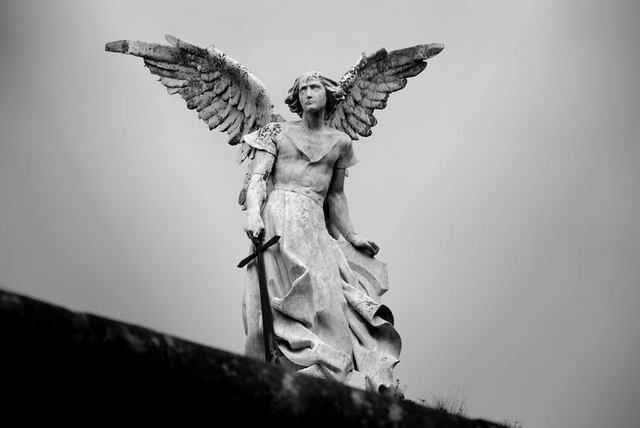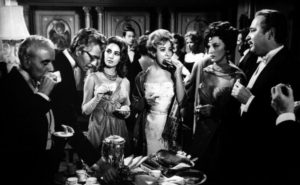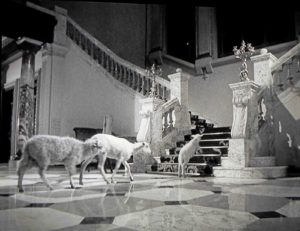
The Exterminating Angel (1962)
Director: Luis Buñuel
Luis Buñuel is remembered as one of the most interesting, influential and renowned film directors of the 20th century. The Spanish filmmaker born in the city of Calanda enjoyed a very privileged childhood, which was always sheltered in the lap of his wealthy family. After receiving a strict catholic education, Buñuel concluded that the biblical scriptures weren’t the solution. Buñuel’s cinematographic style can be defined as a process of intense rebellion against the world that he was forced to accept during his first years in life. His style subverts the lessons of the bourgeoise-christian education. In Buñuel’s filmography, there is a constant series of religious references and portraits of decadent people that are part of the bourgeois and usually trapped in a world full of false appearances and sexual repressions.
His beginnings in cinema date back to 1929. Accompanied by Salvador Dalí, Buñuel filmed one of the most controversial surrealist films of the era, entitled Un Chien Andalou (1929) which would later become a landmark of cinema history. But occasionaly, Buñuel presented films that were more close to social realism, which is the case with the wonderful Los Olvidados (1950), where he masterfully portrays the poverty and youth-crime in the suburbs of Mexico City. We could also include Tristana (1970) here, the story of a young woman who finds refuge in the household of her aristocratic guardian. Nevertheless, Buñuel always seemed to be more comfortable navigating inside strange and dreamlike universes.
 The Exterminating Angel begins with a group of bourgeois characters from Mexico City, which are invited to dinner at the Nóbile family’s mansion. These individuals share many characteristics in common: all of them are frivolous, parasitic and despicable. They are very concerned with manners and social protocols, and the words that emanate from their mouths are a hostile, grotesque and surreal portrait of a “superior class”. Each character is locked in his/her own bubble of pomposity and extravagance.
The Exterminating Angel begins with a group of bourgeois characters from Mexico City, which are invited to dinner at the Nóbile family’s mansion. These individuals share many characteristics in common: all of them are frivolous, parasitic and despicable. They are very concerned with manners and social protocols, and the words that emanate from their mouths are a hostile, grotesque and surreal portrait of a “superior class”. Each character is locked in his/her own bubble of pomposity and extravagance.
After Blanca (Patricia de Morelos) plays a piano sonata, all the guests applaud and say goodbye to each other, ready to return to their houses. Suddenly, something very strange begins to happen, since none of them is able to leave the mansion. Every time when someone approaches the exit a situation or excuse arises, preventing them from going away. Soon, the guests conclude that they have to sleep there, as if they were some kind of refugees who need to protect themselves from the outside.
The next morning all of them realize that they just can’t leave. The door is open, but neither can they escape, nor can outsiders enter the mansion. Food and water start to scarce, some guests begin to fall ill, and others try to cope with the situation in the most “civilized” ways. With the passage of time, the good manners of the bourgeois education begins to die and the survival instinct and macabre human nature begins to arise. The magical and absurd dimensions start to coexist within the human catastrophe while black humor and morbidity make us contemplate the emotional descent of each character.
In his most important work entitled The Social Contract (1762); French writer Jean Jacques-Rousseau established the premise that human beings adopt a prison by becoming part of a society, rejecting the natural freedom that animals enjoy. Rousseau stated that people accept a civil liberty, which is the freedom to behave morally and rationally within the context of rules agreed upon by the general will. Buñuel locks his characters inside a micro-universe in which The Social Contract is completely destroyed. As much as the most noble and rational characters cling to their humanity, most of them begin to descend into an spiral of hysteria and violence. We see pacts of suicide, sexual abuse, hallucinations, etc. The peacocks eventually become hungry hyenas.
The surrealism of some situations is a crucial part of the environment and the film often fills us with absurd dialogues and makes use of repetition to highlight the dreamlike sequences. The character of Leticia (Silvia Pinal) breaks a window for no apparent reason, two characters meet each other and fall in love in a matter of seconds, one of the guests has chicken feet in her bag. Finally, some people seem to be preparing a kind of “joke” that involves 3 lambs and a bear.
film often fills us with absurd dialogues and makes use of repetition to highlight the dreamlike sequences. The character of Leticia (Silvia Pinal) breaks a window for no apparent reason, two characters meet each other and fall in love in a matter of seconds, one of the guests has chicken feet in her bag. Finally, some people seem to be preparing a kind of “joke” that involves 3 lambs and a bear.
The film invites us to delve into the nightmarish human condition. Once we have stripped ourselves of the constructed identity, everything seems to be possible. The Exterminating Angel survives beyond the screen, waiting for the doors to close, until he finally leaves us naked and exposed against a reality that has no explanation. In Buñuel’s words: “If you find the film you are about to see enigmatic or incongruous, so is life. It is repetitive, like life, and open, as life is, to many different interpretations. And it may well be that the best explanation for The Exterminating Angel is that, rationally, there is no explanation…”
by Octavio Carbajal González

I have revisited this movie during the Corona lockdown and it blew me away. Beautiful review, but another really interesting point here is that they celebrate the regained freedom with a mass while the military takes over. Chilling.
Thank you, Gregor.
Absolutely, that point is important. I didn´t want to delve into the ending, the viewers must discover and feel the final sequences. In the early 60s, Mexico didn´t suffer strict military rule, it was until the late years of that decade that the military began to repress our society.
Imprisoned although everything is open? Very contemporary topic indeed!
As time goes by, this movie becomes more disturbing !
Octavio,
Your in-depth review of Luis Buñuel’s satirizing of the aristocracy, the bourgeoisie, religion, and society in his filmography and especially Exterminating Angel has compelled me to revisit his films on Criterion Channel.
I´m sure that you´ll enjoy revisiting Buñuel´s catalogue, Mark. “The Exterminating Angel” is full of uppercuts against the bourgeoisie. There´s a lot to unpack, this film is a true masterpiece.
Thanks for your comment !
Big fan of Bunuel. Without doubt one of the most original film directors of the surrealist era. Love his black humour and contempt of religion and conventional attitudes. Great work my friend!
Your comments are greatly appreciated, Serge. Thank you very much.
Franz Kafka once said: “A book must be the axe for the frozen sea within us…”, the same applies for movies. As time goes by, this masterpiece gets better and better. I´m glad you enjoyed my review !
Hi Octavio, that’s a fantastic review! I’ve pulled out my Bunuel box after reading it, it has been a long time since I’ve last revisited him. I always loved his depiction of the despicable aristocracy/bourgeois losing its masks and composure, and turning into savages, that’s totally my thing, delicious.
Exterminating Angel is a timeless masterpiece of astonishing modernity. Love it how you tie it to Rousseau and educating us here.
Regression is always just around the corner, that’s what I think. Or in Jagger’s words:
“War, children, it’s just a shot away
Rape, murder!
It’s just a shot away”
Here’s another aspect about Bunuel that makes his films more special than most others: “There is certainly no symbolism in my films, but also no psychoanalysis. I hate psychoanalysis.”
My thoughts exactly. Thanks for covering this outstanding film
It´s good to know that you took out and revisited Buñuel´s box !. As you said, his films are delicious experiences.
Rousseau´s magnum opus fits perfectly with this film, as well as those Jagger´s words. Definitely, regression is always there. On the other hand, that´s also one of the things that I appreciate about his work, he doesn´t try to create complex psychoanalysis scenarios, that´s simply not his thing.
After the satisfactory experiences provided by “Los Olvidados”, “Tristana” and “Viridiana”; my definitive devotion to the work of Buñuel came with “The Exterminating Angel”.
Based on the Mexican bourgeoisie, Buñuel created a timeless film that awakes a wide spectrum of feelings. As time passes by, this work of art becomes more powerful. The structure of the story reminded me of the metaphorical resources that Portuguese writer José Saramago uses in his literature. There´s an absurd mix of tragicomedy that leads to incomprehensible and dreadful situations. The mansion´s confinement is as absurd as everything that happens between the mannered and superficial characters.
Thanks for your lovely words !
Fantastic fim and review, bravo!
Very grateful with your comment, Caro.
Remember, VW always brings out the best !
Sounds intruiging! A good opportunity to watch my first Bunuel film!
It’s a beautiful review, Octavio. The depth of knowledge on the topic is extraordinary. And your ability to define the difficult and surreal elements of the film is intriguing. Really pulling the reader in the unique world created by the director. Oh… Love the quote at the end by Buñuel. A great summary. I will certainly need to see this film soon. Thank you.
Thank you so much for your words, Shawn. You know, VW deserves the best.
The first time I saw this film, my brain was totally baffled. I just couldn’t draw any conclusions.
Buñuel’s own style of surrealism portrays man as an animal, as a human being and as a social being. This masterpiece is an apprehensive micro-universe that talks about man´s true nature. I also loved that quote, it´s utterly beautiful. Hope you enjoy the film !
Thanks, Paul. I bet that you won´t be disappointed !